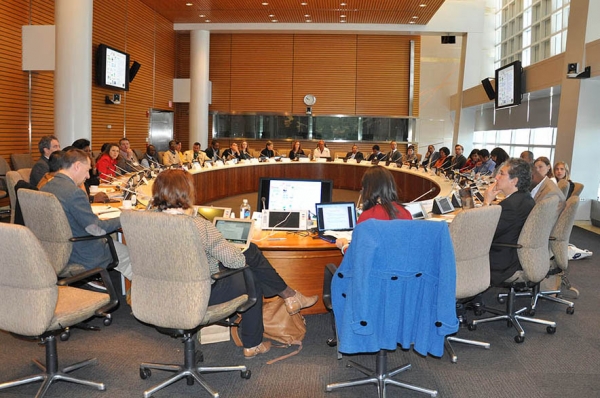
With US$ 600,000 in new funding from the German government, the joint dialogue series will expand to bring together international experts over the next three years to tackle the issue of ensuring REDD+ benefits reach the rural poor.
New Haven, CT, USA -Billions of dollars have been pledged globally to support a mechanism that helps developing countries reduce their greenhouse gas emissions from deforestation and forest degradation—also known as REDD+. While REDD+ holds significant potential to mitigate climate change and improve the livelihoods of forest-dependent communities, concerns persist about to how to ensure REDD+ benefits effectively reach the rural poor.
In an effort to address this important challenge, The Forests Dialogue (TFD) has partnered with the International Union for Conservation of Nature (IUCN) to lead a series of international dialogues as part of a REDD+ Benefit Sharing Initiative. With US$ 600,000 in new funding from the German Federal Ministry for the Environment, Nature Conservation and Nuclear Safety (BMU) over the next two years, this series will expand to include at least four more international discussions over the next three years that will catalyze one of the largest-scale discussions to date on how to design REDD+ benefit sharing systems that address the needs of the poor. The first of these global dialogues recently took place in Washington, D.C., at the end of March. The background paper and meeting materials are available online.
“For REDD+ to maintain its legitimacy, benefits must be shared equitably to include the poor and vulnerable. Through these dialogues, we aim to gain a better understanding of how REDD+ benefit sharing can be designed and implemented to address the needs of the poor,” says Chris Buss, Senior Programme Officer for IUCN’s Forest Conservation Programme. These international dialogues on REDD+ benefit sharing will feed into the outcomes of a global REDD+ parent project being coordinated by IUCN.
These upcoming dialogues, the next of which will take place in Vietnam in in the fall aim to develop a better understanding of the current state of REDD+ benefit sharing, as well as address the challenges of designing and implementing effective and equitable benefit distribution mechanisms in REDD+ countries.
At the international level, TFD brings over a decade of experience in building non-confrontational, multi-stakeholder platforms for discussions of topics relevant to forests. Its Steering Committee provides links with a broad range of actors from indigenous peoples, governmental organizations, NGOs, multilateral agencies and the private sector.
“One of TFDs strengths is that we are not only able to facilitate the sharing of important information among dialogue participants, thereby developing a baseline of understanding, but also, because of our strong and diverse network of practitioners, we are ideally positioned to help promote appropriate economic, policy and institutional arrangements that develop as a result of our process,” says Gary Dunning, Executive Director of TFD.
“Over the years, we have developed a very strong working relationship with IUCN. Most recently, we have collaborated with them on projects focused on “Investing in Locally Controlled Forestry” and “REDD+ Readiness”. We are very excited to be able to contribute to this important undertaking and to continue to work with IUCN,” adds Mr. Dunning.
For more information on these upcoming dialogues please visit www.theforestsdialogue.org.
About REDD+
REDD+ stands for Reducing Emissions from Deforestation and Forest Degradation, and includes the role of conservation, sustainable management of forests and the enhancement of forest carbon stocks in developing countries. REDD+ is a mechanism to mitigate climate change that aims to make forests more valuable standing than they would be cut down, by creating a financial value for the carbon stored in trees. With the right attention to fair, equitable benefit sharing and the robust engagement of forest-dependent communities, REDD+ has the potential to create meaningful benefits for people and biodiversity conservation, while contributing to significant global reductions in greenhouse gas emissions.
About TFD
TFD, The Forests Dialogue, is an autonomous organization hosted by Yale University. Utilizing a multi-stakeholder dialogue process, TFD builds trust among leaders, shared understanding on complex challenges and collaborative solutions on the most urgent global forest issues. http://www.theforestsdialogue.org
TFD partnered in the past with International Institute for Environment and Development (IIED), International Union for Conservation of Nature (IUCN), and World Business Council for Sustainable Development (WBCSD) on the REDD+ Readiness Initiative. More information about TFD’s REDD+ Readiness and REDD+ Benefit Sharing Initiative can be found at: http://www.theforestsdialogue.org
About IUCN
IUCN, International Union for Conservation of Nature, helps the world find pragmatic solutions to our most pressing environment and development challenges. IUCN works on biodiversity, climate change, energy, human livelihoods and greening the world economy by supporting scientific research, managing field projects all over the world, and bringing governments, NGOs, the UN and companies together to develop policy, laws and best practice. IUCN is the world’s oldest and largest global environmental organization, with more than 1,200 government and NGO members and almost 11,000 volunteer experts in some 160 countries. IUCN’s work is supported by over 1,000 staff in 45 offices and hundreds of partners in public, NGO and private sectors around the world. www.iucn.org
